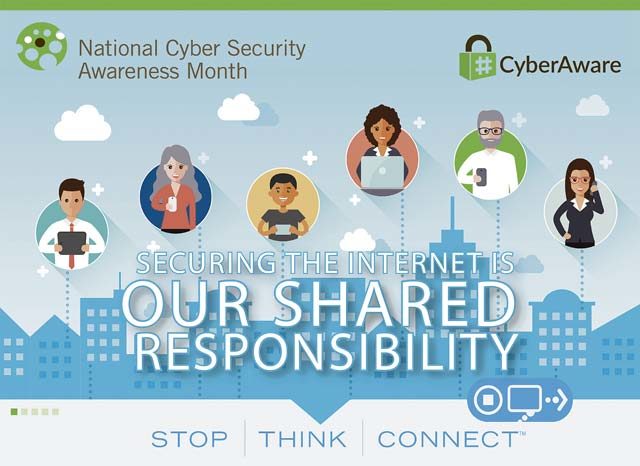
This month, U.S. Army Garrison Rheinland-Pfalz recognizes National Cybersecurity Awareness Month and empowers community members to be safer and more secure online. — Graphic by U.S. Army
The internet is part of everyday life. Whether you are sending an email, ordering something from a website, communicating with friends via social media or looking up the directions to your next destination, you are accessing a world-spanning digital media highway where information is stored, processed and distributed.
It doesn’t take much for that information to end up in the wrong hands. This month, U.S. Army Garrison Rheinland-Pfalz, and Army garrisons around the globe, recognize National Cybersecurity Awareness Month and empower community members to be safer and more secure online.
USAG RP In-for-mation Systems Security Man-ager Tracy McManus said the internet has profoundly shaped how we work and live.
“Increasingly, we depend on the internet as a means to execute the business of our personal and professional lives,” McManus said. “Unfortunately, we are often forced to expose information about ourselves in order to interact online, and this exposure increases the risk that cybercriminals can steal and misuse our data.”
Cybercriminals pose a threat not only to our personal data, but to the operational execution of Army missions. Lt. Gen. Paul Nakasone, commanding general of U.S. Army Cyber Command, explained people are witnessing a fundamental change and transformation in the character of war — a transformation being driven by technology.
“We should anticipate cyberattacks, not only cyberattacks in an area of conflict but against the homeland, certainly against our critical infrastructure and key resources,” he predicted.
McManus encouraged community members to familiarize themselves with online threats and review tips and practices to employ when using the web to keep themselves and the mission safe. The Department of Homeland Security outlines five everyday steps towards online safety:
Enable stronger authentication: Stronger authentication, such as a multi-factor authentication that issues a one-time code to a mobile phone, helps verify that a user has authorized access to an online account.
Make your passwords long and strong: Use complex passwords with a combination of numbers, symbols and letters. Use unique passwords for different accounts.
Keep a clean machine: Update the security software, operating system and web browser on all of your internet-connected devices.
When in doubt, throw it out: Links in email and online posts are often the way cybercriminals compromise your computer. If it looks suspicious, delete it.
Share with care: Limit the amount of personal information you share online and use privacy settings to avoid sharing information widely.
This month, cybersecurity expert Bruce Grantham visits Army garrisons throughout Europe to deliver training on social networking and internet self-defense. The training encompasses spearfishing, ransomware, viruses, cyberbullying, the dark net, web cookies, virtual private networks and more. The effort to bring awareness to cyber threats doesn’t end after October. This month marks the beginning of a year-long Army Cybersecurity Awareness Campaign, building a culture for improving cybersecurity and Army mission readiness. Army Chief Information Officer/Communications Lt. Gen. Bruce Crawford explained the campaign will promote opportunities for training, increase awareness of cybersecurity responsibilities and highlight policies to keep the Army safe and secure.
“Cybersecurity is a readiness priority to enable operational commanders the ability to effectively execute our mission and protect our Soldiers,” he said.
This month and in the months to follow, McManus reminds Soldiers, families and civilians that securing the internet is a shared responsibility that is imperative to our people and mission.


